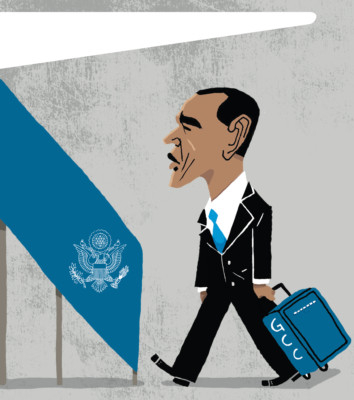
With all the noises that have lately emanated from the recent US-Saudi differences over Washington’s rapprochement with Tehran, it seems that both the Americans and Saudis have quietly moved in the direction of “burying” these differences. This move has of course helped save, at least for now, the historically stable relations of 70 years between the United States and the Saudi Kingdom. Officials in both countries still deeply value the significance of bilateral relations initiated in the mid-1940s immediately after the first ever meeting between the then two head of states, King Abdul Aziz ibn Saud and Franklin D. Roosevelt, on board the American cruiser ‘Quincy’ in the Great Bitter Lake in the Suez Canal.
That meeting paved the way for the everlasting relations and vigorously launched the American campaign of drilling oil in Saudi Arabia via a US Company, CASOC, Aramco’s predecessor. Reflecting its strategic importance as a vital source of energy for the US, Roosevelt appointed the Sidon born, highly trained American diplomat, academic, military expert, CIA co-founder and “Arabist” William Alfred Eddy, as the first resident American Ambassador to the Kingdom. Eddy, who passed away in 1962 and buried in Sidon, laid the many solid foundations which manage to help the bilateral relations to flourish and survive over almost seven decades.
What really annoyed the Saudis in particular is the highly secretive talks between American and Iranian officials which went on for almost two months before a breakthrough that led to singing the agreement on Iran’s nuclear enrichment. Iran, in returned, was rewarded by lifting an embargo on part of its seized assets in American banks since early 1980s.
Simultaneously, American’s Syrian policy seemed to have suddenly made almost a U-turn: moving from a state of hurried campaigning to mobilise allies in preparation to bomb Syrian President Bashar Al Assad’s ’s forces to weaken him in the bloody war in Syria, to a situation of calling off all sorts of confrontation with the Syrian regime in Damascus following the US-Russia agreement to rid Syria of its chemical weapons. The Saudis, and with them many of the rebel groups in Syria, were deeply disappointed as this left Syria’s president stronger and the rebels much weaker.
For the Saudis this has been greatly upsetting as the Kingdom and other Gulf States found themselves alone. President Obama’s reversal action on Syria was hugely disappointing as it wascontrary to what was supposedly a common understanding over the next move against Al Assad. Riyadh’s reaction was emotional and somehow unfamiliar to many when the Kingdom announced on 18 October that it was turning down an American initiative recommending Saudi Arabia to take a two-year non-permanent seat on the UN Security Council, in protest of the international body’s apparent failure to resolve the Syrian conflict.
But the bigger shock came later when the Saudi Intelligence Chief, Prince Bandar Bin Sultan, reportedly told European diplomats his country would be making a major “shift” in its relations with the US. The Prince went even further in showing his anger at Washington’s reluctance to involve itself militarily when he allegedly said that his country would revise its cooperation with the CIA over the Syrian conflict. Prince, Turki bin Al Faisal, a former intelligence Chief and Ambassador to UK and US, described the American action as “lamentable”.
Highly placed sources told this writer that American diplomats in the region have heard similar messages from a number of Arab countries in the Gulf and beyond, including some Gulf states Lebanon, Libya, Tunisia and Jordan as well as Turkey. Saudi and the other states want to see the collapse of the Al Assad regime, the immediate withdrawal of Iran supported Hezbollah militia from Syrian territories and Iran’s influence over Syria diminished.
The Saudis are deeply concerned that any US rapprochement with Tehran may strengthen Iran’s hand not only in the entire Gulf, but also in the Levant. This will make the balance of power tilts in favour of Iran. Turkey also shares this fear to some extent but unlike the Saudi’s reaction the Turks would rather pursue a different approach in dealing with Iran. They prefer dialogue and partnership in discussing the Syrian conflict, which directly affect Turkey’s stability as the country already hosts almost 500,000 Syrian refugees. Therefore, and following the US-Iran understanding agreement over Tehran’s nuclear enrichment, Ankara began contacts with Iranian officials to discuss ways of bringing Syria’s conflict to some sort of agreeable conclusion last month.
On their side, the Americans are quietly reassuring their old allies that any improvement of relations with Tehran won’t be at the expense of GCC States’ security. This point was perfectly made clear by the US Secretary of Defence, Chuck Hagel, in a seminar held in Manama early this month. Simultaneously, Obama said in his weekly memorandum supplying “defence articles and defence services to the GCC will strengthen the US security and promote world peace”. Such public statements are certainly reassuring and sending John Kerry to the region for the 10th time may help, but to seal the rift and clear the misunderstanding, Obama may find it necessary to visit the Kingdom and the region himself sooner.
Mustapha Karkouti is a former president of the Foreign Press Association, London.








